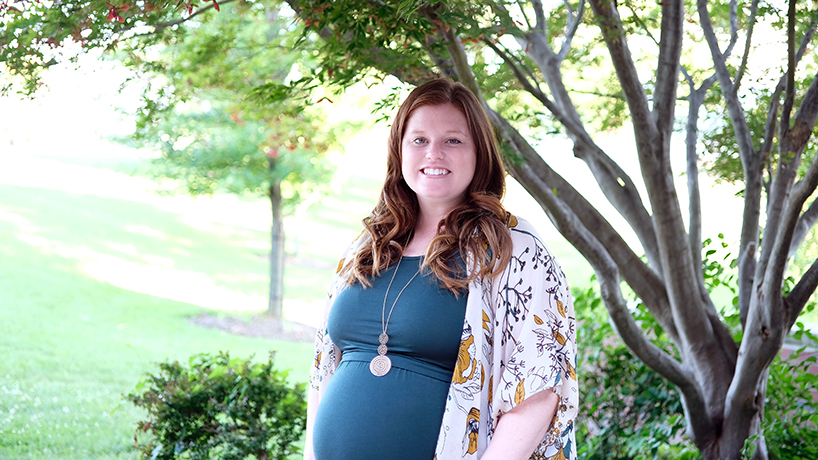
For her DNP clinical scholarship project, Monica Kistler developed guidelines for gynecological post-surgical opioid use. (Photo by Jessica Rogen)
Monica Kistler set herself against the opioid crisis at a time when drug overdose deaths are a growing problem for Missouri.
Though fatal overdoses have decreased 4 percent in the United States overall, the Centers for Disease Control and Prevention reported that Missouri has seen 18.9 percent growth from 2018 to 2019. With her clinical scholarship project, Kistler – a now-graduate of the College of Nursing’s DNP program – joined the ranks of University of Missouri–St. Louis faculty, students and alumni who are taking aim at the problem.
“I think everyone has someone in their life that has been affected by the opioid epidemic,” she said. “That’s how I got interested in that topic.”
A nurse working in an outpatient women’s surgery center, Kistler decided to come at the problem from the supply side. Though the medical world has started publishing guidelines on how much medication to prescribe in varying scenarios, none yet existed for the specific types of outpatient gynecological surgeries that her workplace performed.
“Post-surgical opioid prescription makes sense in a lot of settings – that’s what opioids are for: short-term pain management,” she said. “However, if too many pills are prescribed, the risk is they could be misused by the patient or diverted into the community.
“Prescription opioids are responsible, or at least play some role, in at least half of all opioid overdose deaths, so there was definitely a big need to really figure out how many pills our patients need to adequately treat their pain without providing an oversupply. It’s a big problem, and this is just one tiny sliver, but I think it’s important.”
Kistler decided to develop guidelines that would help determine the correct number of pills for her workplace’s prescribers to provide patients after their three most commonly performed surgeries: hysteroscopy dilation and curettage, laparoscopy and uterine ablation.
She started by surveying all of the center’s patients from the third quarter of 2018 and developed a mean and upper limit for how many pills patients from each surgery took. Kistler wanted to provide recommendations that would satisfy the requirements of 90 percent of patients. Then she created posters from those guidelines and displayed them in the surgery center.
Over the three-month period that the posters were displayed, opioid prescriptions fell significantly for all three procedures that she studied.
For D&Cs, she found that most patients did not take any pain medication, and her posters helped decrease prescriptions by 6.9 percent. Prescriptions after uterine ablations and laparoscopy decreased by 19 and 14 percent, respectively.
“We’ve changed the habits of prescribers,” Kistler said. “I think just giving them information has changed their practice. One thing I learned was that, if you want to see something change, you have to keep it at the forefront of people’s minds. You have to be a little bit persistent, and you have to spend a lot of time on it.”
In recognition of the strength of her work, the College of Nursing chose Kistler to present her DNP project at the University of Missouri System Board of Curators meeting in November as part of the Graduate Student Research Showcase.
The college also selected Kistler, an August graduate, for the Innovations in Clinical Practice Award, which recognizes a student who breaks new ground.
“I was really honored,” she said. “A lot of people worked on this. Several nurses, surgical technologists and staff members reviewed and help revise the posters. It is also a testament to how incredibly receptive the surgeons that I work with are. They really want to prescribe things appropriately and keep their patients safe.”
Kistler also recognized the support she received from her site mentor, Roselyn Lampkins, and her UMSL committee members, Alicia Hutchings and Laura Kuensting.
Though Kistler doesn’t plan to continue working on the opioid crisis at this time, she sees herself replicating the form of her project for other topics.
“I hope to be able to use the template of this project for other quality initiatives,” she said. “It’s given me the tools to see an idea from start to finish. I’ve learned a lot about how the whole system works and how to motivate people to reflect on their practice. I hope to use these new skills wherever I go after this.”














